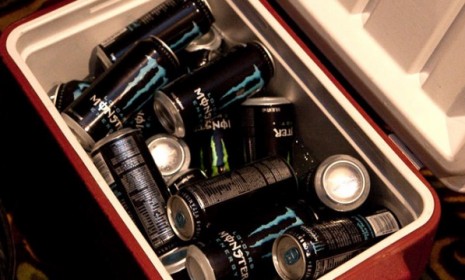Can too much caffeine kill you?
Monster Energy is back in the spotlight after the FDA reports that, in the past three years, five people may have died from downing the company's drinks

A free daily email with the biggest news stories of the day – and the best features from TheWeek.com
You are now subscribed
Your newsletter sign-up was successful
Energy drinks are under scrutiny again. Not only has the Food and Drug Administration released a report stating that five people in the past three years may have died from consuming Monster Energy products, but a Maryland couple is suing the company behind the popular line of energy drinks, for the death of their 14-year-old daughter last December. Anais Fournier died from a heart complication after allegedly drinking two 24-ounce cans of Monster on back-to-back days. An autopsy revealed she died of "cardiac arrhythmia due to caffeine toxicity."
Though the company denies that its products are dangerous, the lawsuit "charges that Monster failed to warn about the risks of its energy drinks," says Barry Meier at The New York Times.
Monster Energy spokesman Evan Pondel issued this statement:
The Week
Escape your echo chamber. Get the facts behind the news, plus analysis from multiple perspectives.

Sign up for The Week's Free Newsletters
From our morning news briefing to a weekly Good News Newsletter, get the best of The Week delivered directly to your inbox.
From our morning news briefing to a weekly Good News Newsletter, get the best of The Week delivered directly to your inbox.
Over the past 16 years Monster has sold more than 8 billion energy drinks, which have been safely consumed worldwide. Monster does not believe that its beverages are in any way responsible for the death of Ms. Fournier. Monster is unaware of any fatality anywhere that has been caused by its drinks.
The Fourniers' lawsuit raises the question: How much caffeine is too much?
While caffeine is legal, it's still a potentially dangerous psychoactive stimulant that can show up in the blood stream within five minutes of ingestion, cardiac surgeon Dr. Marc Gillinov tells CBS News. "Caffeine toxicity," or consuming high amounts of caffeine, can cause irritability, hyper-aroused states (including insomnia), abnormal heart beat, and, sometimes, cardiac arrest. Consuming more than 1 gram of the stimulant can trigger serious reactions; at 10 grams, it can cause death.
But consuming even 1 gram of caffeine can be a tall order: A 12-ounce cup of Starbucks coffee, for example, contains about 260 milligrams, meaning you'd have to drink about four cups to ingest 1 gram.
A free daily email with the biggest news stories of the day – and the best features from TheWeek.com
On the surface, the Fourniers' case does not look strong. A 24-ounce can of Monster, like the two cans their daughter reportedly consumed, contains about 240 milligrams of caffeine, says Maggie Fox and Linda Carroll at NBC News, meaning that Anais only ingested 480 milligrams over two days. (It also contains many other ingredients, including sugar, ginseng, amino acids like taurine and L-carnitine, salt, guarana seed, and B vitamins.)
But, most experts agree, caffeine sensitivity, and therefore potential risks of exposure, can vary from person to person. The American Academy of Pediatrics recommends that adolescents and youth stay away from energy drinks altogether.
-
 The EU’s war on fast fashion
The EU’s war on fast fashionIn the Spotlight Bloc launches investigation into Shein over sale of weapons and ‘childlike’ sex dolls, alongside efforts to tax e-commerce giants and combat textile waste
-
 How to Get to Heaven from Belfast: a ‘highly entertaining ride’
How to Get to Heaven from Belfast: a ‘highly entertaining ride’The Week Recommends Mystery-comedy from the creator of Derry Girls should be ‘your new binge-watch’
-
 The 8 best TV shows of the 1960s
The 8 best TV shows of the 1960sThe standout shows of this decade take viewers from outer space to the Wild West